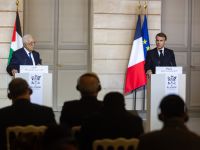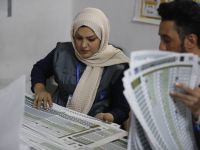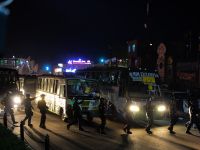The European Union and the United States called on Ivory Coast's new President Laurent Gbagbo to solidify the west African nation's return to democracy by ensuring fair elections in December's legislative race.
In a statement by the French presidency, the EU urged Gbagbo, sworn in as Ivory Coast president on Thursday, to "guarantee the democratization" demanded by the opposition, barred from taking part in last Sunday's presidential elections that brought Gbagbo to power.
Legislative elections in Ivory Coast are set for December 10, and the EU statement said it was "essential that the process of returning to a constitutional and democratic order takes place in incontestable and verified conditions of transparency and fairness, enabling all the country's democratic forces to take part" in achieving civil peace and national cohesion.
International opinion has been divided over recognizing the legitimacy of the new authorities in Ivory Coast, with several leaders calling for a re-run of the presidential poll.
France, the former colonial power and currently EU president, was at first virtually alone in backing Gbagbo.
However, the United States, after initially calling for a re-run, has said it will work with the new president -- although President Bill Clinton's administration did officially recognize the new government.
"We recognize countries, not specific governments or individuals," said State Department deputy spokesman Philip Reeker. "We're prepared to work with governing authorities in Cote d'Ivoire; Gbagbo was inaugurated yesterday and we will deal with him and his government."
However, Reeker stressed that the United States awaited "the restoration of democracy" and issued a "call to all parties to cooperate towards that end ... that the voices of the disenfranchised be heard."
The election that ushered Gbagbo into power drew less than 40 percent of Ivorian voters, who joined in an election boycott after the Supreme Court barred the vast majority of candidates from standing.
"The elections were flawed from the outset because they excluded political parties," Reeker said. "It is important that the parliamentary elections take place on December 10."
The chairman of the Organization of African Unity (OAU), Togolese President Gnassingbe Eyadema, said if Ivorians accept Gbagbo's new government, "we must join them."
"What we want is to avoid bloodletting. That must end, and Ivorians must fraternally return to working hand in hand to develop country," Eyadema said in Paris, where he was meeting with French President Jacques Chirac.
"Ivory Coast doesn't affect only Ivorians, it affects the entire sub-region" because of its economic influence, he said.
France's former prime minister Alain Juppe warned that if Ivory Coast fell into a long-running conflict, it would be catastrophic.
"They must do everything today to lower the temperatures and bring the main players back to the table," Juppe said.
"Find a rule to the game that will allow the organization of (legislative) elections, that's the way to go," he added – PARIS (AFP)
© 2000 Al Bawaba (www.albawaba.com)







